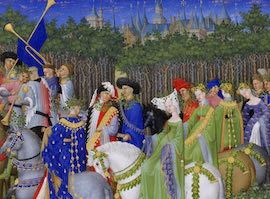Guest Blog: Sarah Grochala On BREXIT STAGE LEFT

Within the context of our Brexit times, it seems British people have become increasingly inward-looking.
But how much is this true of British theatre? In many ways, it would appear that despite the UK's imminent exit from Europe, European theatre is alive and thriving on British stages.
Over the past few years, the work of European directors has occupied a prominent place within the UK theatre ecology. The Belgian theatre director Ivo van Hove has become a regular presence in theatre programmes, from the National Theatre to the Young Vic to the West End. Young directors, such as Robert Icke, increasingly look to Europe for inspiration.
As an Anglo-Polish playwright, I've always had one foot firmly on both sides of the English channel. I've been lucky enough to have had the chance to see a wide variety of European work at theatres and theatre festivals across the continent. I've also had the chance to meet and build relationships with other European artists and theatre professionals.
In 2015, at the Istanbul Theatre Festival, I was asked to take over as the coordinator of the English language committee of Eurodram. Eurodram is a European-wide network which seeks to promote the translation and exchange of contemporary drama across the wider European area (Europe, North Africa, former USSR). Keen to have the opportunity to discover more new plays by European writers, I happily took on the role.

Once in my new position, I began to be regularly approached by playwrights from across Europe asking if I could get their plays produced in the UK. My instinctive reaction to this was that I probably couldn't. I quickly found myself asking myself why I thought that it would be so difficult to get European plays produced on British stages.
European work may enjoy a certain level of popularity with audiences in the UK, but most European theatre produced in the UK takes the form of either work by European directors or European theatre companies. When these shows take a play as their starting point, the tendency is to choose plays that are already familiar to an English audience: Shakespeare, Ibsen, Chekov, or even a contemporary British play.
The Europeanness of the production is in the way a familiar play is translated by a European director or company. The focus is on the Europeanness of the perspective that is taken on the play or the visual dramaturgy of the production.
There are not a lot of European plays on UK stages. Currently, these make up less than 1% of British theatre programmes. While there are a number of theatre companies and festivals producing European plays on the fringe (e.g. Cervantes Theatre, LegalAliens, Foreign Affairs, Stone Crabs, Voila Europe), only two ACE NPO theatre companies regularly include this work as part of their core remit: the Gate (around two productions per year) and Actors Touring Company (around one production per year).
A few theatres regularly include European plays as part of their programme (e.g. Theatre Royal Plymouth, Theatre Royal Bath, the Royal Court, the Orange Tree and the Arcola), but most theatres in the UK do not stage contemporary European plays at all.

Where European plays are staged, there is a tendency to produce them in ways that bring a reassuring British element to the production. For example, translations of European plays are often adapted for performance by established British playwrights.
This leads me to wonder what the reasons are for this lack of contemporary European plays on British stages. Where are the barriers located? Is there currently a lack of funding for this work? Are audiences genuinely reluctant to see new plays from outside the UK? Are new European plays really so different to new British plays?
In order to explore these questions, I've organised a mini-festival of reading of European plays at the Yard Theatre in London this week, including seven European plays and one British play. We've kept the nationality of each play and the identity of the playwright secret and have been asking audiences to try and identify whether a play is European or British.
Last night, a large number of our audience identified a Danish play about the housing market as seeming British. I'm interested to see if the audience will actually be able to spot the British play, which has still yet to be performed.
Rather than trying to get specific plays by specific European writers onto UK stages, I'm keen to start a wider conversation about why we are reluctant to programme them, in that hope that this might inspire us to include more of these plays as part of our theatre ecology. After all, with Brexit looming, now more than ever, it is important for us to look outwards to the world beyond our shores.
Brexit Stage Left at The Yard Theatre until 11 January
Picture credit: Charlie Aja, Korisbo, Jean Limbourg
Comments
Videos

